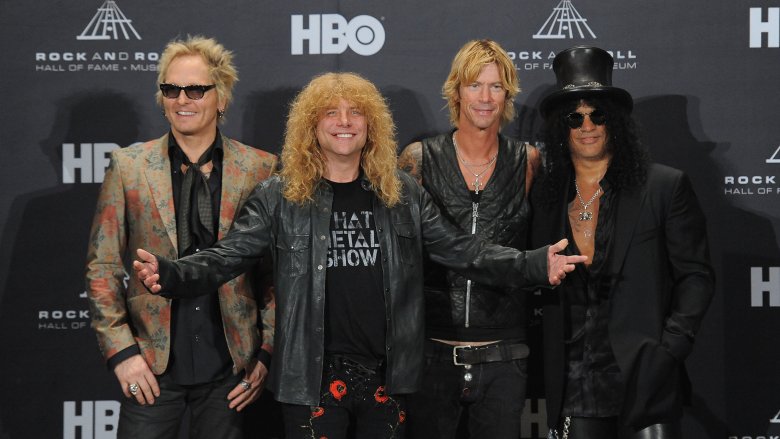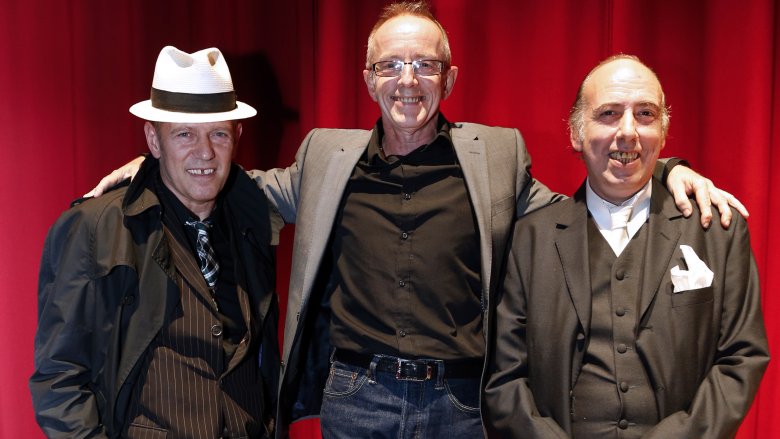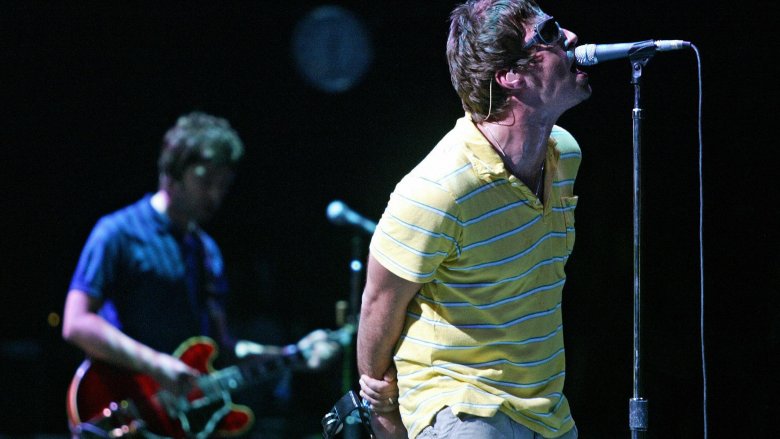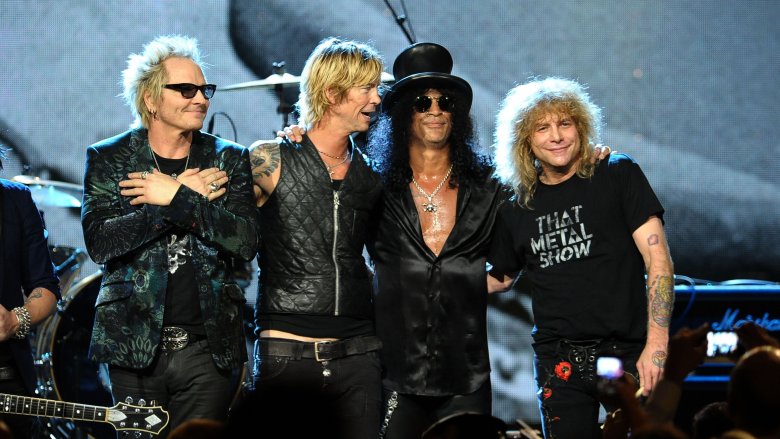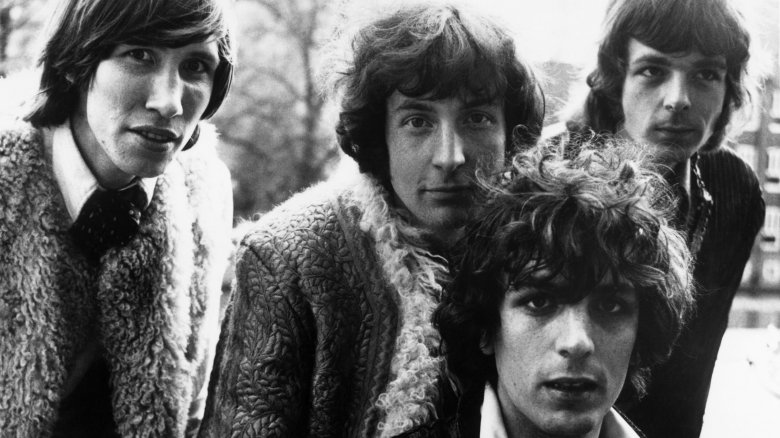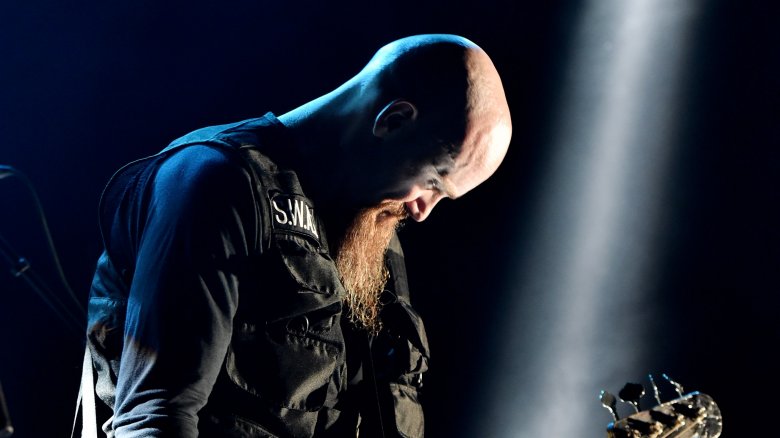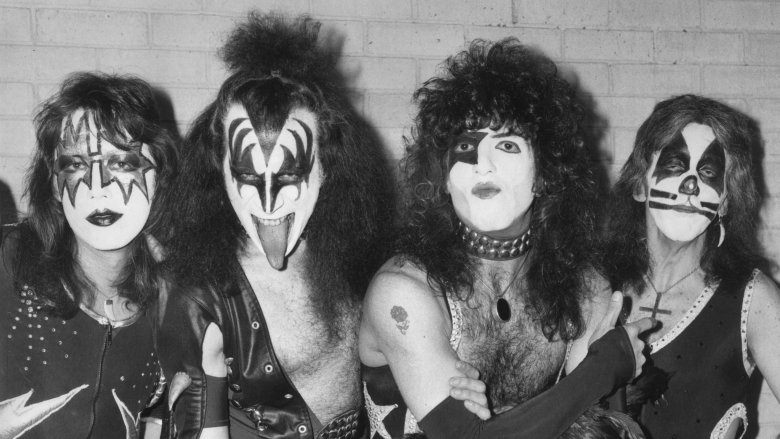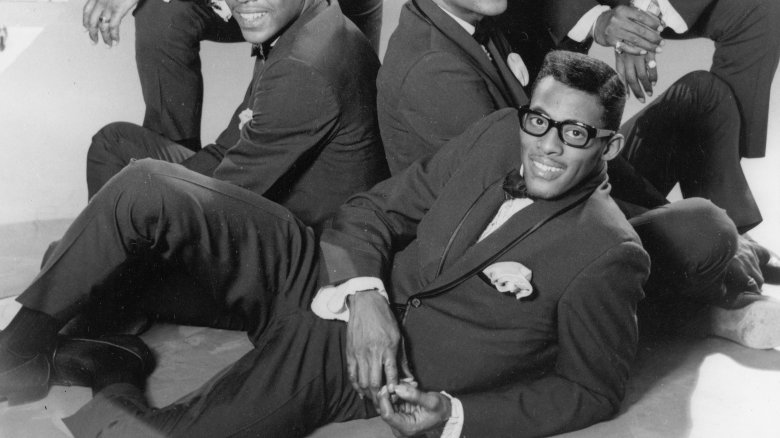Musicians Kicked Out Of Bands Right After They Made It Big
There has to be something painful about being a musician who gets kicked out of a band just before it hits the big time. There's the sting of rejection, of course, and the constant wondering, the bitterness, and that little voice in the back of your head that won't stop repeating: It could have been you. Your friends got rid of you, they're all the better for it, and now you're stuck working in a dentist's office in Utah. All in all, it's not hugely fun.
But it might be even worse to be thrown out of a group just after they've found fame and fortune. In that scenario, you've had a taste of success — enough to show you what it's like, but not enough to leapfrog into your own lucrative solo career. In many ways, it's the ultimate nightmare for artists — and it does happen, every now and again. Just ask these musicians.
Gregg Rolie comes to journey's end
Gregg Rolie was one of the founding members of Journey, brought on as a keyboardist and lead vocalist by manager Herbie Herbert in 1973. The band struggled to make it off the mark but eventually found success with the release of their fourth album, Infinity, in 1978. The album went triple platinum in the U.S. and finally put Journey on the map. It also, however, spelled doom for Rolie's tenure in the group.
It was Steve Perry, who had been recruited to the band shortly prior to Infinity, who had taken lead vocal duties on the album, pushing Rolie to backing vocalist. By the time Departure was released in 1980, he was being pushed further and further away from the band. Rolie himself believed that Perry didn't like him singing, and Journey's new vocalist got his way. By the end of 1980, Rolie was out, and Perry had become Journey's sole vocalist.
Dave Abbruzzese wanders into the sunset
When Matt Chamberlain left Pearl Jam in 1991, he had suggested that Dave Abbruzzese come in as his replacement. Abbruzzese was with the band through the release of Ten (which has since gone platinum 13 times) and Vs., which set a brief record for the most sales of an album in its debut week. After the band's third album, Vitalogy, had been recorded, however, Abbruzzese left the group. The band suggested the split was mutual and had come about because Abbruzzese wished to play and study music elsewhere.
In fact, it soon became clear that Abbruzzese had been fired by the band. "For reasons that I don't completely understand," he said, "the other members decided it was necessary to fire me in order to pursue a philosophy which they perceive as incompatible with mine." The band's manager soon admitted this was closer to the truth, as in, exactly the truth. Pearl Jam released their third album soon after, while Abbruzzese suggested he might "gather up the nest egg, climb in a mobile home and get lost in America."
Andy Nicholson misses the boat to America
Arctic Monkeys stormed onto the British music scene in 2006 with the release of their debut album, Whatever People Say I Am, That's What I'm Not. At that time, the band consisted of musicians Alex Turner, Matt Helders, Jamie Cook, and Andy Nicholson. WPSIATWIN was the fastest-selling debut album in U.K. history, managing to shift over 350,000 copies in the first week alone. It was a critical success, too, and the band took off for a tour of the States the same year.
By the end of that year, however, Nicholson (the bassist) had been asked to leave the band. He missed their tour of America having been too fatigued after their European dates. After the band returned to the U.K., they officially sacked him. Despite that, Nicholson remained on good terms with the band and even reunited with them at their Leeds Festival set in August 2006.
Topper Headon is given one last chance in the worst place imaginable
Topper Headon joined The Clash after meeting their guitarist, Mick Jones, at the bar in London's Rainbow Theatre. After a brief audition, he was invited to join the band and was soon thrown into the group's punky, raucous world. During Headon's tenure with The Clash, the band found fame in the U.K. — touring with a host of legendary punk bands — and finally broke through to American audiences with the release of London Calling, by far their most famous album. London Calling received widespread critical acclaim and sold 2 million copies.
Headon, however, was taking fame badly. He had developed a significant drug problem that was seriously affecting his playing. He was given one last opportunity by Joe Strummer to make good at their next stop on the tour. Unsurprisingly, he succumbed to his desires at the gig — which took place in Amsterdam — at which he wantonly cut cocaine in front of all his bandmates. (In other bands, this would probably be a requirement, but good for The Clash.) Headon was suspended from the group on their return to London and was cut for good shortly afterward. He struggled with drug addiction, disease, and homelessness for years before finally overcoming his demons and finding work rehabilitating other addicts.
Tony McCarroll pulls a Pete Best
Tony McCarroll was a young musician from Manchester who, at the very beginning of the '90s, formed a band called The Rain with Paul McGuigan and Liam and Noel Gallagher. Before long, however, they changed their name to Oasis. You probably know some of the ensuing details here. In 1994, the band released their debut LP Definitely Maybe, which went to No. 1 in the U.K. almost immediately and made the group a household name. The year after, in April 1995, Oasis released "Some Might Say": their first U.K. No. 1 single. The very same month, McCarroll was booted from the band.
According to McCarroll himself, his firing was relayed to him in a three-minute phone conversation with the band's manager. The band insisted McCarroll was let go because of his "poor" drumming, but bigger problems surfaced later. In 1999, he filed a lawsuit against the band demanding royalties for his contributions to their early music — using the same lawyer Pete Best had hired to do the exact same thing to the Beatles. He eventually settled with the band and made himself a neat £600,000.
Steven Adler goes cold turkey
Guns N' Roses were on top of the world by the time they fired Steven Adler. Their debut LP, Appetite for Destruction, had made their name and then some, and the album's standout track, "Sweet Child o' Mine," quickly became one of history's most successful and iconic rock songs. The follow-up album G N' R Lies wasn't exactly a commercial failure, either.
During this time, however, Adler (who was the band's drummer) had a serious predilection for drugs. In 1990, he was making an attempt to give up heroin and had succumbed to the intense physical effects of going cold turkey. When he asked Slash for some time to recover before recording "Civil War," Slash refused — and fired him when he was unable to play in the studio. Adler fell back into drugs, became suicidal, and almost died in a truck crash a few years later. He is now sober.
Syd Barrett loses it
After forming in 1965, the band known as Pink Floyd — which had been started by Syd Barrett, Roger Waters, Richard Wright, and Nick Mason — entered the studio and began recording music for the first time. Their debut album, The Piper at the Gates of Dawn, was released in 1967. It was a critical and commercial success in the U.K. Despite all that, however, Barrett was beginning to behave more and more erratically — behavior that some put down to his constant use of LSD. He would detune his guitar during shows, refuse to play, and even just lose track of reality and stare dumbfoundedly while people interacted with him.
In 1967, Dave Gilmour was brought in to reinforce Barrett during his episodes and, a few months later, was removed from the band altogether after growing tired of his antics. At first, the band neglected to even tell him he was fired, preferring to simply not pick him up and bring him to gigs. It wasn't until mid-1968 that the band officially announced Barrett's departure from the band.
Nick Oliveri freaks out
Although they formed in the mid-'90s, it wasn't until the beginning of the 21st century that Queens of the Stone Age really found their footing. Their first two albums gained them a little attention, but it was Songs for the Deaf that really saved the day. It was critically lauded and commercially successful, and by 2003 it was certified gold. Less than a year later, Josh Homme had taken the decision to fire Nick Oliveri, the band's bassist, from the group.
Since his firing, Oliveri has shown understanding toward Homme, explaining that he had been let go for drinking a bottle of vodka before a show and "freaking out" when Homme refused to play with him. Rumors have persisted to this day, however, that Homme actually kicked the musician out of the band after it became clear that Oliveri had been acting in an abusive manner toward his (Oliveri's) girlfriend.
Criss quits KISS
Peter Criss has the considerable honor of quitting KISS no fewer than three times. He had joined Gene Simmons and Paul Stanley in 1972 and was with the group during their rise to fame in the late '70s. Among their most successful albums during Criss' first stint in KISS were Alive!, Destroyer, Rock and Roll Over and Alive II. But tensions had been bubbling between Criss and the rest of the band, and they eventually came to a surface. According to Criss, he felt that he failed to fit in with Stanley and Simmons, who were college-educated, and soon decided he would prefer to spend time with his family.
Stanley, meanwhile, suggested in 2012 that Criss had become "impossible and intolerable" and too much to take for the other members of the band. He left the group in 1980 — but whether he was fired or left of his own volition remains a point of contention between Camp KISS and Camp Criss. Either way, they tried and failed two more times, so maybe everyone should go their own way.
David Ruffin succumbs to temptation
In 1963, David Ruffin — a young singer from Mississippi — was brought in to join The Temptations when their previous tenor vocalist, Al Bryant, was kicked out of the group. It was with Ruffin that The Temptations rose to fame, scoring hit after hit through the latter half of the '60s.
Fame came for Ruffin, too, but so did its downsides. The musician began using cocaine and became more and more egotistical toward the other members of the group, at one point even demanding they change their name to David Ruffin and the Temptations. Ruffin's excesses at last grew too many, and he was fired from the group in 1968. His solo career was a disappointment compared to his time in The Temptations, and a few brief stints in prison led him down an even darker path. A brief reunion with his old group in 1983 couldn't save him, either: Ruffin died in 1991 after visiting a crack house in Philadelphia.
